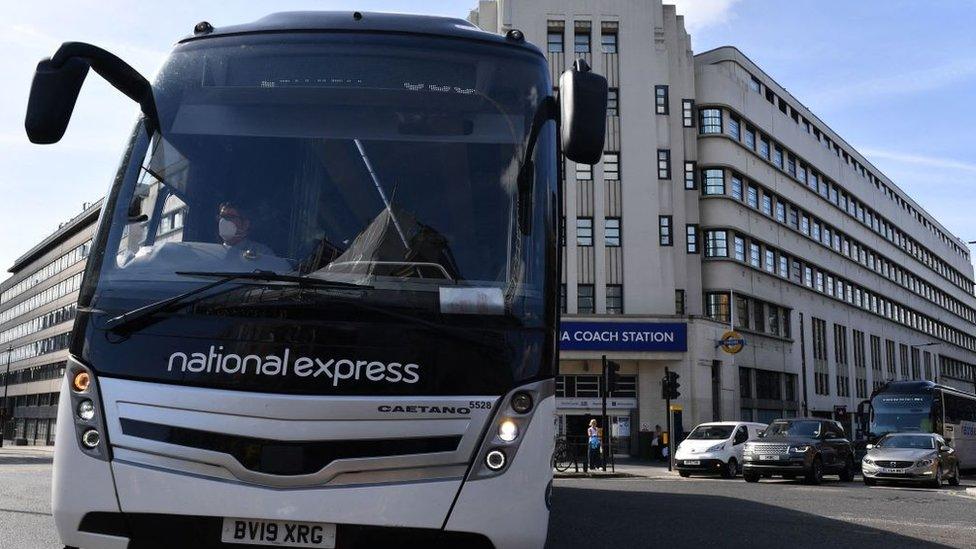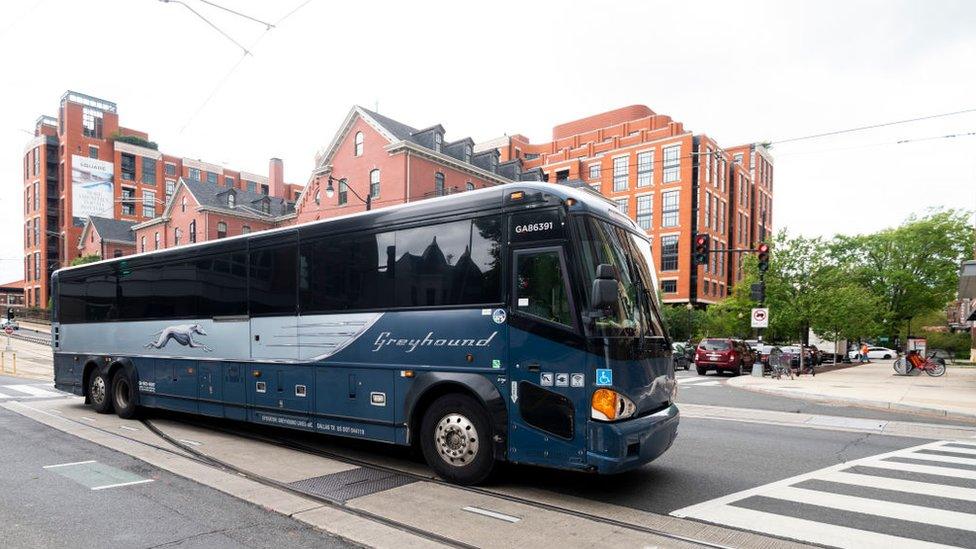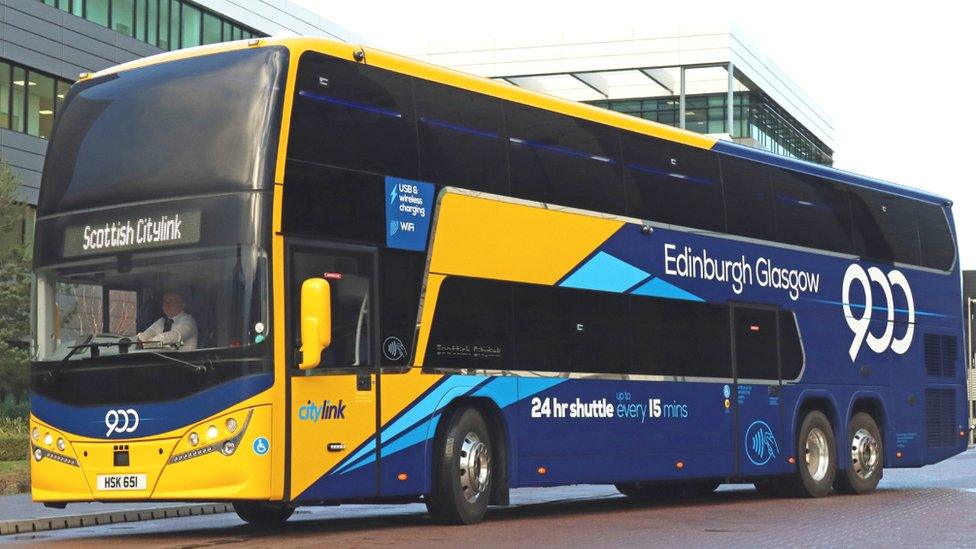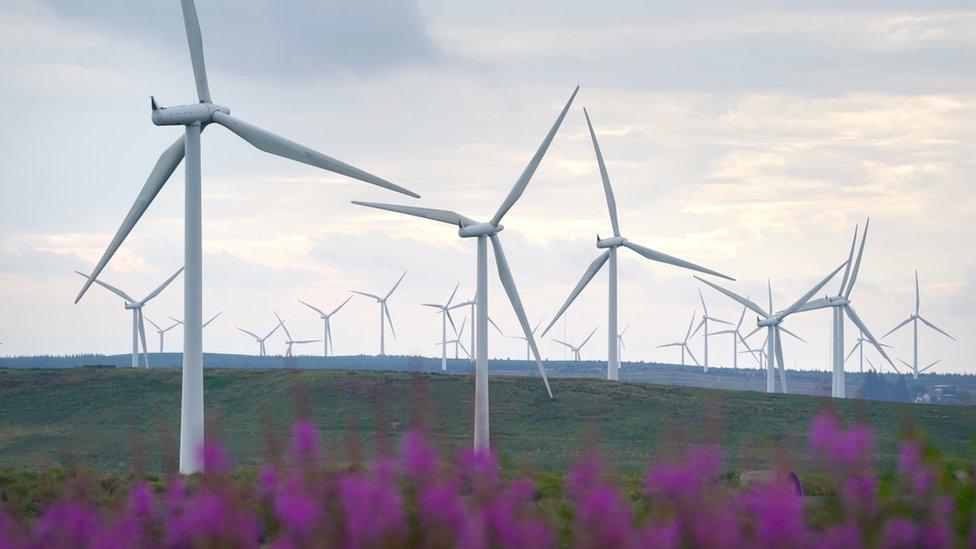Why have Stagecoach and FirstGroup been so diminished?
- Published

Why have Scotland's two public transport giants been so diminished?
First Group in Aberdeen has had to sell its core US business, and fallen back on the bus services it wanted to sell
Stagecoach merges with National Express to tap into green and net zero opportunities, but also because it ran out of the fuel for expansion.
Other business sectors would dearly love to have the problems afflicting buses. Just ask hospitality, as it faces a Christmas even more calamitous than the last one.
Transport operators have been showered with pandemic pounds to keep routes running.
And they are seen as being in the sweet spot for the drive to net zero, so grants are helping that transition to battery, and powering up depots with charging points.
When the UK government's energy minister went to Whitelee wind farm to boast of his support for a pioneering hydrogen plant there, it was buses he wanted to plug, even though the actual purpose is to run Glasgow's fleet of rubbish and recycling trucks.
Flying the green flag for corporate Scotland at the COP26 gathering last month in Glasgow was the electric bus shuttle run by the nation's two big operators.
Transformed and diminished
So this is a good time to be at the wheel of a bus company, right?
Wrong. Stagecoach's Martin Griffiths is losing the chief executive's seat in Perth to the boss at National Express, as it works towards their newly agreed merger, around a year from now.
Why such a long period? Just one of the less attractive elements of the job is how heavily regulated it can be, especially when the Competition and Markets Authority comes calling.
The public end of the merger talks - though it's perceived also as a takeover by the Birmingham-based coach company - has taken an unusually long three months, requiring an extension to the usual time limit for takeover and merger rules.
Up the A90 in Aberdeen, the other big Scottish success story of the bus deregulation era, FirstGroup, has been going through a tortured period.
It failed to find a buyer for its UK bus services, when it wanted to focus instead on US school buses and transit. It lost rail franchises, including ScotRail, and a year ago exited other franchises, including the west coast main line, in a deal with the Department for Transport.
Last year, it wasn't sure it would remain a going concern through the pandemic. It had to offload the prized US offshoots which had been the core business less than three years ago, switching back to focus on the UK buses it had been trying to sell.
And it had to sacrifice its chief executive, Matthew Gregory, under assault from a major shareholder, the hedge fund Coast Capital. Having pushed his predecessor out as well, it blamed him for selling First Student and First Transit too cheaply and at the wrong time.
FirstGroup marked the recent annual general meeting by telling shareholders it was transformed - financially sound due to those US sales, to which Greyhound was then added, but a much diminished version of what it had been and had aspired to be.
Corporate eco-warrior
Why has it proven so difficult to make Scotland's two big bus companies get on the right route? They've followed different routes to get to where they are now - one scaled-down and humbled, the other being merged into a much bigger entity, as its founding siblings, Sir Brian Souter and Dame Ann Gloag, ease their way out.
Their current state reflects problems that afflict the bus industry as a whole, most notably the long term decline in passenger numbers.
Prosperity for many has meant a car or second car to replace the bus commute, in this country and the US. When Stagecoach had to give up on its Megabus US operation, it did so because cheap fuel had put people back behind the wheels of their cars. The same problem beset FirstGroup's iconic Greyhound coaches.

FirstGroup announced the sale of its Greyhound bus service in October, so it can fully focus on UK transport
Retail's well-rehearsed wrestle with the internet hit footfall, but at least retailers can take their business online: that's not an option for transport firms when shopping trips are cut back.
Despite all those new bus lanes, growing congestion only made the bus passenger experience worse and journey times less predictable.
In recent months, a new challenge is ensuring they have enough drivers. Stagecoach admits the shortage is losing it mileage, and is grateful that local authorities are being understanding.
If demand for buses had not been walloped by Covid, with FirstGroup recently saying it's at around 65% of pre-pandemic demand, the driver shortage could be a real crisis for the industry.
What's coming down the road is further reform to regulation. In Scotland, that could mean a franchise model, though many in politics would like to see a return to municipal bus companies. If Lothian Buses can make a success of it and outdo commercial rivals with its marketing in and around Edinburgh, then why not others?
FirstGroup grew out of Grampian Regional Council's bus operator, which explains its Aberdeen headquarters,
Sir Brian Souter had been a bus driver in the council-operated era, giving him insights into ways that Stagecoach could pick off lucrative routes and run a more efficient alternative, capitalising on the deregulation of the Thatcher era.
It seems that era is over now. Stagecoach's brand will likely remain but the plc and HQ will go. Not everything will be lost from Perth: it still intends to open an 85-seat contact centre in the Fair City next year.
That opportunity to tap into the drive for net zero is the dominant theme of the publicly expressed rationale for the National Express deal - that and more access to capital, plus £45m per year in synergy savings.
The buccaneering business ways of the Stagecoach of the 1980s and 1990s have given way to the self-image of a corporate eco-warrior - a champion of low emission public transport versus the car.
- Published14 December 2021

- Published22 November 2021

